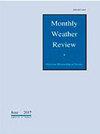基于回归的集合Kalman滤波器对闪电数据同化中零梯度问题的集合扰动
IF 3
3区 地球科学
Q3 METEOROLOGY & ATMOSPHERIC SCIENCES
引用次数: 0
摘要
闪电观测与对流云的发展密切相关,有可能与高分辨率数值天气预测模型进行对流尺度数据同化。集合卡尔曼滤波器(EnKF)的主要挑战包括,在观测到闪电的地方,没有集合成员具有非零闪电。在这种情况下,不同的模型状态提供了全零闪电,并且EnKF不能有效地吸收非零闪电数据。这个问题被称为零梯度问题。这项研究通过添加基于回归的系综扰动来解决零梯度问题,该扰动源于整个计算域中模拟闪电和大气变量之间的统计关系。如果具有非零闪电的系综成员的数量小于规定的阈值(Nmin),则应用基于回归的系综扰动。日本一次强降水事件的观测系统模拟实验表明,即使只有少数成员有非零闪电,基于回归的系综扰动也会增加系综的传播,并成功地诱导出与对流相关的分析增量。此外,应用基于回归的集合扰动可以提高降水量的预测精度,尽管这种提高对Nmin的选择很敏感。本文章由计算机程序翻译,如有差异,请以英文原文为准。
Regression-Based Ensemble Perturbations for the Zero-Gradient Issue Posed in Lightning-Flash Data Assimilation with an Ensemble Kalman Filter
Lightning flash observations are closely associated with the development of convective clouds and have a potential for convective-scale data assimilation with high-resolution numerical weather prediction models. A main challenge with the ensemble Kalman filter (EnKF) includes that no ensemble members have non-zero lightning flashes in the places where a lightning flash is observed. In this situation, different model states provide all zero lightning, and the EnKF cannot assimilate the non-zero lightning data effectively. This problem is known as the zero-gradient issue. This study addresses the zero-gradient issue by adding regression-based ensemble perturbations derived from a statistical relationship between simulated lightning and atmospheric variables in the whole computational domain. Regression-based ensemble perturbations are applied if the number of ensemble members with non-zero lightning flashes is smaller than a prescribed threshold (Nmin). Observing system simulation experiments for a heavy precipitation event in Japan show that regression-based ensemble perturbations increase the ensemble spread and successfully induce the analysis increments associated with convection even if only a few members have non-zero lightning flashes. Furthermore, applying regression-based ensemble perturbations improves the forecast accuracy of precipitation although the improvement is sensitive to the choice of Nmin.
求助全文
通过发布文献求助,成功后即可免费获取论文全文。
去求助
来源期刊

Monthly Weather Review
地学-气象与大气科学
CiteScore
6.40
自引率
12.50%
发文量
186
审稿时长
3-6 weeks
期刊介绍:
Monthly Weather Review (MWR) (ISSN: 0027-0644; eISSN: 1520-0493) publishes research relevant to the analysis and prediction of observed atmospheric circulations and physics, including technique development, data assimilation, model validation, and relevant case studies. This research includes numerical and data assimilation techniques that apply to the atmosphere and/or ocean environments. MWR also addresses phenomena having seasonal and subseasonal time scales.
 求助内容:
求助内容: 应助结果提醒方式:
应助结果提醒方式:


